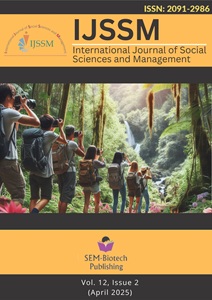Power, People, and Pacts: A 21st Century Perspective on India-Nepal Relations
DOI:
https://doi.org/10.3126/ijssm.v12i2.75594Keywords:
India-Nepal relations; Geopolitical dynamics; Belt and Road Initiative; Regional connectivity; Cultural diplomacyAbstract
India and Nepal’s bilateral ties reflect a blend of deep historical connections and modern geopolitical complexities. While rooted in cultural and religious affinity, the relationship has faced significant challenges, including territorial disputes and the rise of China’s influence in Nepal. This paper examines the transformative role of China’s Belt and Road Initiative (BRI) and its soft power strategies, alongside India’s efforts to counterbalance through development assistance, cultural diplomacy, and pragmatic engagement. Highlighting both challenges and opportunities, the study underscores the need for renewed cooperation in connectivity, energy partnerships, and fostering mutual respect to build a resilient and sustainable relationship.
Int. J. Soc. Sc. Manage. Vol. 12, Issue-2: 72-76.
Downloads
Downloads
Published
How to Cite
Issue
Section
License
Copyright (c) 2025 International Journal of Social Sciences and Management

This work is licensed under a Creative Commons Attribution-NonCommercial 4.0 International License.
This license enables reusers to distribute, remix, adapt, and build upon the material in any medium or format for noncommercial purposes only, and only so long as attribution is given to the creator.




